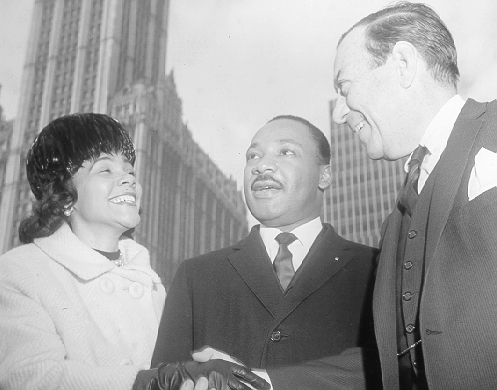
Mrs. Coretta Scott King, Dr. Martin Luther King, Jr. and Mayor Robert F. Wagner, 1964
Steven A. Levine
Coordinator for Educational Programs
After returning from the March on Washington this weekend, I
have been reading people’s reminiscences and analyses of the March on
Washington for Jobs & Freedom 50 years ago today. One thing is clear: the goals of the March were
not only to end legal apartheid in the United States, but to create as the
Marchers demanded “that every person in this nation, black or white, be given
training and work with dignity to defeat unemployment and automation.” Education historian Diane
Ravitch recalled in her blog that, “For that brief few hours in time, the
theory was reality, and we knew that change was coming, that it was inevitable.
The only question was not whether it would happen, but when.” She then contrasted that moment to the
present when “Much has changed, but not enough. Barack Obama is President, but
poverty among people of color remains scandalously high and racial segregation
is no longer treated as outrageous.”
Sadly our commitment as a nation and a city to tackling
segregation and poverty have nearly vanished in the last 50 years. Poverty in New York City has increased from
18.4% in 2008 to 20.1% in 2011, reflecting national trends, while President
Obama and other politicians constantly reference the middle class and rarely
mention the poor in their speeches.
In contrast, Mayor Robert F. Wagner’s speeches in the 1960s
reflected a commitment to combating poverty unlikely to be uttered by a
presidential candidate today. Speaking
at the United Neighborhood Houses on December 3, 1964, he laid out a long
term commitment to New York’s anti-poverty programs,
"I would rather move slowly and
build a firm foundation for action, bearing in mind the long-range and
sustained nature of the effort that will be required . . . not just the
semblance of action, but truly to prevail in the war against poverty, which
means also to prevail in the war against discrimination and disadvantage."
Unfortunately, the war in Vietnam sidelined the War on
Poverty and the Wagner’s “firm foundation” never received the necessary federal
resources. With the election of Richard
Nixon in 1968, the War on Poverty ended and the 1975 fiscal crisis led to a
massive austerity in New York City.
